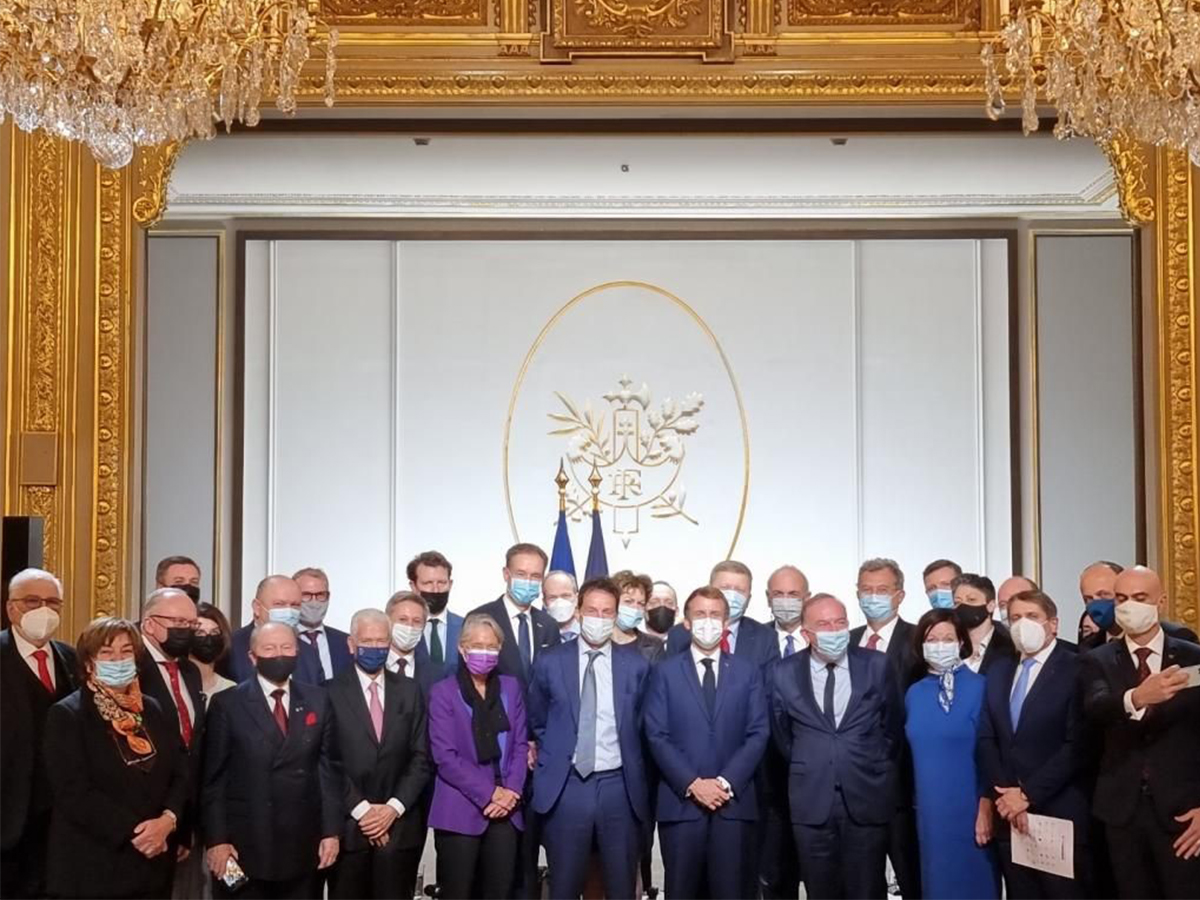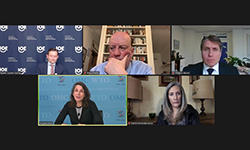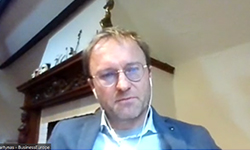BusinessEurope Headlines No. 2021-36
Paris Declaration: business priorities for the French EU Presidency

On 26 November, Presidents of BusinessEurope’s 40 member federations urged the future French Presidency of the Council of the European Union to combat the complexity of EU legislative proposals that is hampering the development of the millions of small, medium-sized and large European enterprises they represent. They defined seven issues of crucial importance for the European companies. BusinessEurope President Pierre Gattaz said: "There are growing concerns in the business community about legislative proposals that put European companies at a disadvantage when competing on global markets. Enterprises cannot cope with this never-ending accumulation of constraints and administrative requirements”. BusinessEurope urges the French Presidency to focus on restoring Europe's economy and combating legislative complexity. “To reconcile climate ambitions with industrial competitiveness, the European legal framework must facilitate innovation and minimise transition costs”, Gattaz highlighted.
![]() Contact: Nathan Munch
Contact: Nathan Munch
EU’s Global Gateway initiative
Watch BusinessEurope Director General Markus J. Beyrer comment on this initiative, which is welcomed by European business.
Employers organisations globally join their voices in support of trade
 On 1 December, the “Business coalition for trade, employment and sustainable development” was launched. Lead by the International Organisation of Employers (IOE), this initiative seeks to enhance dialogue between business and international organisations, like the World Trade Organisation (WTO). BusinessEurope Director General, Markus J. Beyrer, said: “This type of dialogue has become critical in the context of the COVID-19 pandemic and our efforts towards a strong and sustainable recovery. Businesses play a key role and recognise their responsibility in leading the economic recovery by investing, creating jobs, innovating and trying to keep supply chains operational. But we cannot do it alone. We need a clear and enabling environment, based on modern, reliable and enforceable rules”. In this regard, the postponement of the 12th WTO Ministerial Conference should not mean the halting of the negotiations and discussions to reform the organisation. “It’s still crunch time for the WTO”, stated Beyrer. He added that “From our part, we will continue to stress the urgency for tangible results and reiterate our support to multilateralism and the WTO. In this, we are happy to join our voice with our counterparts in the context of this coalition”.
On 1 December, the “Business coalition for trade, employment and sustainable development” was launched. Lead by the International Organisation of Employers (IOE), this initiative seeks to enhance dialogue between business and international organisations, like the World Trade Organisation (WTO). BusinessEurope Director General, Markus J. Beyrer, said: “This type of dialogue has become critical in the context of the COVID-19 pandemic and our efforts towards a strong and sustainable recovery. Businesses play a key role and recognise their responsibility in leading the economic recovery by investing, creating jobs, innovating and trying to keep supply chains operational. But we cannot do it alone. We need a clear and enabling environment, based on modern, reliable and enforceable rules”. In this regard, the postponement of the 12th WTO Ministerial Conference should not mean the halting of the negotiations and discussions to reform the organisation. “It’s still crunch time for the WTO”, stated Beyrer. He added that “From our part, we will continue to stress the urgency for tangible results and reiterate our support to multilateralism and the WTO. In this, we are happy to join our voice with our counterparts in the context of this coalition”.
Contact: Sofia Bournou
7th EU-Africa Business Forum: preparations launched
 “The EU-Africa Business Forum (EABF) is an important platform for promoting public private dialogue, which is a key mechanism for improving the investment climate in African countries. The topics we will discuss at the EABF next year will have a strong impact on future EU-Africa relations”, said Luisa Santos, Deputy Director General of BusinessEurope, at the high-level launch event for the preparations of the 7th EABF on 26 November. The event was organised by the European and African Union Commissions and featured speeches by African Union Commissioner Albert Muchanga and Koen Doens, Director-General of the Directorate-General for International Partnerships (INTPA), as well as by high-level representatives of European and African private sector organisations. It was aimed at explaining to the European and African private sector how they can contribute to the preparations of the upcoming EABF. The 7th EABF will take place in Brussels on 16 and 17 February 2022 as a hybrid event, back-to-back with the EU-Africa Summit held on 17 and 18 February. In addition to the physical event, an online forum will take place during the week of 14 February 2022, allowing for a large number of hybrid and online workshops, conferences and networking opportunities. “We welcome the efforts by the European Commission to mobilise companies and business organisations from both continents to get involved in the preparations of the EABF. BusinessEurope will work proactively with the Commission and European and African private sector organisations to make this event a success”, Santos added.
“The EU-Africa Business Forum (EABF) is an important platform for promoting public private dialogue, which is a key mechanism for improving the investment climate in African countries. The topics we will discuss at the EABF next year will have a strong impact on future EU-Africa relations”, said Luisa Santos, Deputy Director General of BusinessEurope, at the high-level launch event for the preparations of the 7th EABF on 26 November. The event was organised by the European and African Union Commissions and featured speeches by African Union Commissioner Albert Muchanga and Koen Doens, Director-General of the Directorate-General for International Partnerships (INTPA), as well as by high-level representatives of European and African private sector organisations. It was aimed at explaining to the European and African private sector how they can contribute to the preparations of the upcoming EABF. The 7th EABF will take place in Brussels on 16 and 17 February 2022 as a hybrid event, back-to-back with the EU-Africa Summit held on 17 and 18 February. In addition to the physical event, an online forum will take place during the week of 14 February 2022, allowing for a large number of hybrid and online workshops, conferences and networking opportunities. “We welcome the efforts by the European Commission to mobilise companies and business organisations from both continents to get involved in the preparations of the EABF. BusinessEurope will work proactively with the Commission and European and African private sector organisations to make this event a success”, Santos added.
Contact: Benedikt Wiedenhofer
Opening up or closing in? New approaches to trade and investment in China and Europe
 “The trade and investment relationship between the EU and China continues to be unbalanced. The EU-China Comprehensive Agreement on Investment (CAI) is a good tool to work towards a level playing field. But, unfortunately, the CAI will continue to be frozen as far as Chinese sanctions on EU Members of the European Parliament persist”, said BusinessEurope Deputy Director General Luisa Santos at the Industry Dialogue panel of the Hamburg Summit: China meets Europe on 30 November. The Hamburg Summit is a high-level biennial conference on Sino-European relations, and a leading platform for business, political and academic leaders to discuss issues of mutual interest. The Industry Dialogue covered issues such as whether the investment regimes in the EU and China are converging, as well as the impact of the dual circulation-strategy of China and the EU trade defence instruments on the bilateral relationship. “The EU and China should keep the dialogue open, not only on issues like climate and standards, but also on the economic relationship overall as many upcoming policies will impact companies on both sides”, Santos stated. She added that EU Member States should keep a coordinated approach when dealing with China, something that is increasingly happening on issues like foreign subsides.
“The trade and investment relationship between the EU and China continues to be unbalanced. The EU-China Comprehensive Agreement on Investment (CAI) is a good tool to work towards a level playing field. But, unfortunately, the CAI will continue to be frozen as far as Chinese sanctions on EU Members of the European Parliament persist”, said BusinessEurope Deputy Director General Luisa Santos at the Industry Dialogue panel of the Hamburg Summit: China meets Europe on 30 November. The Hamburg Summit is a high-level biennial conference on Sino-European relations, and a leading platform for business, political and academic leaders to discuss issues of mutual interest. The Industry Dialogue covered issues such as whether the investment regimes in the EU and China are converging, as well as the impact of the dual circulation-strategy of China and the EU trade defence instruments on the bilateral relationship. “The EU and China should keep the dialogue open, not only on issues like climate and standards, but also on the economic relationship overall as many upcoming policies will impact companies on both sides”, Santos stated. She added that EU Member States should keep a coordinated approach when dealing with China, something that is increasingly happening on issues like foreign subsides.
Contact: Elena Suárez
BusinessEurope supports Global Industry letter on Cross-border Data Transfers from China
 BusinessEurope co-signed last week a Global Industry letter regarding the draft Security Assessment Measures for Cross-border Data Transfers recently issued by the Cyberspace Administration of China (CAC). The letter underscores the benefits of cross-border data transfers to China’s economy and governmental policy objectives and makes several procedural and substantive recommendations to the CAC. Recommendations include that the data transfer measures should (1) not impose greater restrictions on data transfers than necessary; (2) afford equal treatment to Chinese and foreign enterprises, services, and technologies; and (3) be administered in a uniform, impartial, and reasonable manner with a view to ensuring non-discriminatory and streamlined approvals. The letter is the third in a series of letters that global associations have shared with Chinese authorities in relation to the data transfer aspects of China’s draft Personal Information Protection Law, China’s draft Data Security Law, and China’s Cybersecurity Law. BusinessEurope had already co-signed an earlier letter on concerns regarding China’s draft personal information protection law (PIPL) and data security law (DSL). The letter regarding the draft Security Assessment Measures for Cross-border Data Transfers was submitted to the Chinese authorities on 1 December 2021.
BusinessEurope co-signed last week a Global Industry letter regarding the draft Security Assessment Measures for Cross-border Data Transfers recently issued by the Cyberspace Administration of China (CAC). The letter underscores the benefits of cross-border data transfers to China’s economy and governmental policy objectives and makes several procedural and substantive recommendations to the CAC. Recommendations include that the data transfer measures should (1) not impose greater restrictions on data transfers than necessary; (2) afford equal treatment to Chinese and foreign enterprises, services, and technologies; and (3) be administered in a uniform, impartial, and reasonable manner with a view to ensuring non-discriminatory and streamlined approvals. The letter is the third in a series of letters that global associations have shared with Chinese authorities in relation to the data transfer aspects of China’s draft Personal Information Protection Law, China’s draft Data Security Law, and China’s Cybersecurity Law. BusinessEurope had already co-signed an earlier letter on concerns regarding China’s draft personal information protection law (PIPL) and data security law (DSL). The letter regarding the draft Security Assessment Measures for Cross-border Data Transfers was submitted to the Chinese authorities on 1 December 2021.
![]() Contact: Benedikt Wiedenhofer
Contact: Benedikt Wiedenhofer
Europe is ageing: employers’ call for reforms in pension systems
 Europe’s rapid ageing puts pressure on the financial sustainability of pensions systems. Achieving sustainable and adequate pensions systems in the long-term requires longer careers and regular adjustments of the legal retirement age to longer life expectancy. Modernising national pension systems is necessary to ensure their financial sustainability. It is also crucial to embrace longer working lives and more diversified careers. Some EU Member States have progressed more than others in this process. Pension systems should be based on well-defined eligibility criteria that correspond to contribution periods. They should be accessible to all people interested provided they are ready to contribute while employed/exercising economic activity. On top of public pension systems (first pillar), supplementary pensions such as occupational pensions (second pillar) or private pension plans (third pillar) have an important role to play. Each Member State needs to develop its pension system in a harmonious way, making good use of the potential of the three pillars. Social partners’ involvement, especially as regards occupational pensions schemes, is a condition for their appropriate design and high enrolment rate. These were the main messages passed by Maxime Cerutti, Social Affairs Director, during the BusinessEurope event that took place on 29 November within the framework of the European Retirement Week.
Europe’s rapid ageing puts pressure on the financial sustainability of pensions systems. Achieving sustainable and adequate pensions systems in the long-term requires longer careers and regular adjustments of the legal retirement age to longer life expectancy. Modernising national pension systems is necessary to ensure their financial sustainability. It is also crucial to embrace longer working lives and more diversified careers. Some EU Member States have progressed more than others in this process. Pension systems should be based on well-defined eligibility criteria that correspond to contribution periods. They should be accessible to all people interested provided they are ready to contribute while employed/exercising economic activity. On top of public pension systems (first pillar), supplementary pensions such as occupational pensions (second pillar) or private pension plans (third pillar) have an important role to play. Each Member State needs to develop its pension system in a harmonious way, making good use of the potential of the three pillars. Social partners’ involvement, especially as regards occupational pensions schemes, is a condition for their appropriate design and high enrolment rate. These were the main messages passed by Maxime Cerutti, Social Affairs Director, during the BusinessEurope event that took place on 29 November within the framework of the European Retirement Week.
![]() Contact: Anna Kwiatkiewicz-Mory
Contact: Anna Kwiatkiewicz-Mory
Creating the right opportunities for EU’s digital and tech competitiveness
 “Taking a smart approach to digital regulation will enhance growth and investment in key technologies, including AI, quantum computing, future connectivity, and other key technologies”, said BusinessEurope Director for Internal Market Martynas Barysas, at the online event “The Multisided Path to European Digital Sovereignty and the future of EU-US Relations”, organised by the independent network of Southern-European think tanks PromethEUs on 30 November. Speaking about the EU’s tech and digital competitiveness, he highlighted that a greater focus on better regulation principles will ensure that digital regulation remains innovation and investment-friendly and that our ability to derive the benefits of new technologies will also depend “on the ability for companies to research, test, acquire a skilled workforce, and have appropriate infrastructure to build upon.” In his conclusions, Barysas stressed that the EU’s digital and tech competitiveness will rely on the diversity of resources that Europe can bring forward jointly, rather than on one or few EU Member States.
“Taking a smart approach to digital regulation will enhance growth and investment in key technologies, including AI, quantum computing, future connectivity, and other key technologies”, said BusinessEurope Director for Internal Market Martynas Barysas, at the online event “The Multisided Path to European Digital Sovereignty and the future of EU-US Relations”, organised by the independent network of Southern-European think tanks PromethEUs on 30 November. Speaking about the EU’s tech and digital competitiveness, he highlighted that a greater focus on better regulation principles will ensure that digital regulation remains innovation and investment-friendly and that our ability to derive the benefits of new technologies will also depend “on the ability for companies to research, test, acquire a skilled workforce, and have appropriate infrastructure to build upon.” In his conclusions, Barysas stressed that the EU’s digital and tech competitiveness will rely on the diversity of resources that Europe can bring forward jointly, rather than on one or few EU Member States.
Contact: Adnane Lachheb
Predictable bank rules to finance the green and digital transition
 On Wednesday 1 December, BusinessEurope's Economic & Financial Affairs Committee Chair Klaus Deutsch spoke at the Spanish Banking Federation conference “Basel Impacts on the European Economy” in a panel discussion about “Challenges of Basel III Implementation in Europe”. Whilst recognising the European Commission’s efforts to implement the standards in a way that reflects the specificities of the EU economy and banking sector, he stressed the need for predictability and clarity after transition periods expired to ensure that companies can continue to access bank financing and hedge their corporate risks on reasonable terms. Bank loans would have to cover a significant part of the total financing needs that are needed to finance the green and digital transition and these financing needs are long-term.
On Wednesday 1 December, BusinessEurope's Economic & Financial Affairs Committee Chair Klaus Deutsch spoke at the Spanish Banking Federation conference “Basel Impacts on the European Economy” in a panel discussion about “Challenges of Basel III Implementation in Europe”. Whilst recognising the European Commission’s efforts to implement the standards in a way that reflects the specificities of the EU economy and banking sector, he stressed the need for predictability and clarity after transition periods expired to ensure that companies can continue to access bank financing and hedge their corporate risks on reasonable terms. Bank loans would have to cover a significant part of the total financing needs that are needed to finance the green and digital transition and these financing needs are long-term.
Contact: Erik Berggren
Ensuring a redress system that delivers to consumers not intermediaries
 To have an effective system, abuse proof and one that really channels compensation to consumers, it is important that the representative actions directive is transposed in a balanced and appropriate way. The directive is not perfect, but it still offers a combination of features that when put up together could deliver a good redress system at national level. These features around transparency, funding, quality criteria for entities representing consumers will ensure that we keep a US style litigation culture at bay, one where lawyers and litigation funders usually take up the biggest share of the compensation (typically per claim 1 million dollars for lawyers and only 32 dollars for consumers). These messages were voices by Jolanda Girzl, Vice-Chair of BusinessEurope’s Consumer Working Group during a workshop with stakeholders and EU Member States organised by the European Commission on the implementation of the Directive (EU) 2020/1828.
To have an effective system, abuse proof and one that really channels compensation to consumers, it is important that the representative actions directive is transposed in a balanced and appropriate way. The directive is not perfect, but it still offers a combination of features that when put up together could deliver a good redress system at national level. These features around transparency, funding, quality criteria for entities representing consumers will ensure that we keep a US style litigation culture at bay, one where lawyers and litigation funders usually take up the biggest share of the compensation (typically per claim 1 million dollars for lawyers and only 32 dollars for consumers). These messages were voices by Jolanda Girzl, Vice-Chair of BusinessEurope’s Consumer Working Group during a workshop with stakeholders and EU Member States organised by the European Commission on the implementation of the Directive (EU) 2020/1828.
Contact: Pedro Oliveira
Early ratification of trade pillar is a priority for both Mexico and the EU
 “Diversifying both import sources and export markets is a priority for companies. This will help build resilience to disruptions in global value chains and counter protectionist trends”, said BusinessEurope Deputy Director Eleonora Catella at the XXVII Congress of Foreign Trade of Mexico, organised by the Mexican Business Council for Foreign Trade, Investment and Technology, AC (COMCE) on 25 and 26 November. The European Union and Mexico share the same interest in a deep reform of the World Trade Organisation and combining the consolidation of the multilateral trade framework with the conclusion of the bilateral trade agreement that was “agreed in principle” in 2018. “A modernisation of the so-called Global Agreement in force since 2000 and a swift entry into force of the trade pillar of the deal would help especially small and medium-sized enterprises diversifying their business at a time when the economic recovery is still fragile”, added Catella.
“Diversifying both import sources and export markets is a priority for companies. This will help build resilience to disruptions in global value chains and counter protectionist trends”, said BusinessEurope Deputy Director Eleonora Catella at the XXVII Congress of Foreign Trade of Mexico, organised by the Mexican Business Council for Foreign Trade, Investment and Technology, AC (COMCE) on 25 and 26 November. The European Union and Mexico share the same interest in a deep reform of the World Trade Organisation and combining the consolidation of the multilateral trade framework with the conclusion of the bilateral trade agreement that was “agreed in principle” in 2018. “A modernisation of the so-called Global Agreement in force since 2000 and a swift entry into force of the trade pillar of the deal would help especially small and medium-sized enterprises diversifying their business at a time when the economic recovery is still fragile”, added Catella.
Contact: Eleonora Catella
Competitiveness Council: our key messages
 The EU Competitiveness Council held its regular meeting on 25-26 November, featuring “the jumbo package on the mega trend”: Digital Services Act and Digital Markets Act, which will largely shape Europe’s digital transition and future. BusinessEurope considers that the agreed Council’s general approach on these legislative acts is a good step towards a balanced regulatory framework for digital services. At the same time, we argue that no steps back on key provisions should be taken at the next stage, in the trialogue negotiations on this legislation with the European Parliament next year. It is regrettable that at the last week’s meeting, the Council demonstrated its position’s fragility, a number of EU Member States having tabled their individual “statements” with diverging wishes for the trilogue phase of the law-making and ultimate outcome. While ensuring a trusted digital environment and contestable digital markets, this package should not lose the focus of promoting the provision of digital services across borders in the Single Market and giving that vital opportunity for Europe’s SMEs to grow. BusinessEurope also calls on the Member States to ensure continuity of the Competitiveness Council discussions on key issues for industry, such as the Fit for 55 package, Better Regulation and removal of the Single Market barriers, to result in tangible outcomes supporting the EU’s competitiveness.
The EU Competitiveness Council held its regular meeting on 25-26 November, featuring “the jumbo package on the mega trend”: Digital Services Act and Digital Markets Act, which will largely shape Europe’s digital transition and future. BusinessEurope considers that the agreed Council’s general approach on these legislative acts is a good step towards a balanced regulatory framework for digital services. At the same time, we argue that no steps back on key provisions should be taken at the next stage, in the trialogue negotiations on this legislation with the European Parliament next year. It is regrettable that at the last week’s meeting, the Council demonstrated its position’s fragility, a number of EU Member States having tabled their individual “statements” with diverging wishes for the trilogue phase of the law-making and ultimate outcome. While ensuring a trusted digital environment and contestable digital markets, this package should not lose the focus of promoting the provision of digital services across borders in the Single Market and giving that vital opportunity for Europe’s SMEs to grow. BusinessEurope also calls on the Member States to ensure continuity of the Competitiveness Council discussions on key issues for industry, such as the Fit for 55 package, Better Regulation and removal of the Single Market barriers, to result in tangible outcomes supporting the EU’s competitiveness.
![]() Contact: Martynas Barysas
Contact: Martynas Barysas
Taxonomy can support green transition if well designed
 “The investment challenge to reach EU’s sustainable objective is huge and the Taxonomy can become the EU’s asset to support the ongoing transition efforts of the business community”, stated Carolina Vigo, coordinating BusinessEurope’s work on Sustainable Finance at the Conference “Sustainable finance: the evolution of European regulation”, organised by the Confederation of Italian Industry (Confindustria) on 1 December. “This is why BusinessEurope has been supportive of this tool since day 1, and this is why our efforts are aimed at its effective implementation”, she added. BusinessEurope is particularly contributing to the ongoing work on Taxonomy reporting and has repetitively called the European Commission to provide guidance and establish a help desk to support companies’ disclosure requirements as soon as possible. In her concluding remarks, Carolina stressed that reporting rules and technical screening criteria are currently subject to a myriad of interpretations that could undermine the very objective of the Taxonomy.
“The investment challenge to reach EU’s sustainable objective is huge and the Taxonomy can become the EU’s asset to support the ongoing transition efforts of the business community”, stated Carolina Vigo, coordinating BusinessEurope’s work on Sustainable Finance at the Conference “Sustainable finance: the evolution of European regulation”, organised by the Confederation of Italian Industry (Confindustria) on 1 December. “This is why BusinessEurope has been supportive of this tool since day 1, and this is why our efforts are aimed at its effective implementation”, she added. BusinessEurope is particularly contributing to the ongoing work on Taxonomy reporting and has repetitively called the European Commission to provide guidance and establish a help desk to support companies’ disclosure requirements as soon as possible. In her concluding remarks, Carolina stressed that reporting rules and technical screening criteria are currently subject to a myriad of interpretations that could undermine the very objective of the Taxonomy.
Contact: Carolina Vigo
Collaboration is essential to foster Research & Innovation
 “Investing in Research & Development today means to collaborate more than in the past”, stressed Carolina Vigo, coordinating BusinessEurope’s work on Research & Innovation (R&I) at the IGLO Conference “Knowledge at the heart of the future of Europe” on 30 November. It may be hard for companies to fully capture the innovation potential of a technology because of its rising complexity and interdisciplinary nature or due to internal constraints. “Companies are increasing their share of R&I investments dedicated to collaborative projects and are reaching to new partners and sectors”, Vigo added. In the same vain, pan-European associations should cooperate more with the objective of fostering Research & Innovation in Europe. “To do so, we should not blindly call for ‘knowledge first’, but better underline the value of Research & Innovation to address economic and societal challenges. This will convince the public in committing to Research & Innovation. This will leverage private investments. And this will make Europe an innovation leader”, she concluded.
“Investing in Research & Development today means to collaborate more than in the past”, stressed Carolina Vigo, coordinating BusinessEurope’s work on Research & Innovation (R&I) at the IGLO Conference “Knowledge at the heart of the future of Europe” on 30 November. It may be hard for companies to fully capture the innovation potential of a technology because of its rising complexity and interdisciplinary nature or due to internal constraints. “Companies are increasing their share of R&I investments dedicated to collaborative projects and are reaching to new partners and sectors”, Vigo added. In the same vain, pan-European associations should cooperate more with the objective of fostering Research & Innovation in Europe. “To do so, we should not blindly call for ‘knowledge first’, but better underline the value of Research & Innovation to address economic and societal challenges. This will convince the public in committing to Research & Innovation. This will leverage private investments. And this will make Europe an innovation leader”, she concluded.
Contact: Carolina Vigo
Calendar 
- 8 - 12 February: EU Industry Days
- 28 February: Monitoring and evaluation in lifelong guidance – towards future European standards?
Not yet a subscriber? Register here.
Reminder: please have a look at our privacy policy